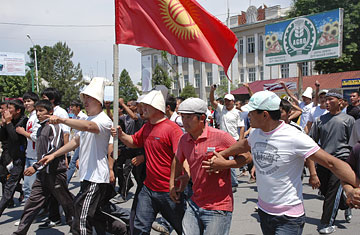
Protestors carry a state flag as they march toward the university in Jalalabad, Kyrgyzstan, on May 19, 2010
(2 of 2)
Indeed, Bakiyev skillfully played Moscow and Washington — whose facility at the Kyrgyz air base of Manas is a vital conduit of troops and supplies for U.S. operations in Afghanistan — and secured significant aid from both. Some suggest Russian displeasure with Bakiyev — who had earlier reneged on closed-door understandings to shut down Manas, an intolerable presence in Moscow's backyard — played a part in fomenting this April's insurrection.
Moreover, since the U.S. invasion of Afghanistan in 2001, a number of Central Asia's avowedly secular demagogues have capitalized on often over-exaggerated fears of Islamist extremism in the region to clamp down on any political challenge — most noticeably in Uzbekistan in May 2005, when government soldiers confronted a supposed insurgent uprising by firing into a massed crowd of demonstrators in the city of Andijan. Several hundred people were reportedly killed, most of whom were innocent civilians agitating for greater rights.
A smattering of U.S. and E.U.-backed NGOs exist in the region to help promote better governance and democracy. But their influence pales in comparison to that of Moscow and, increasingly, Beijing, whose thirst for Central Asia's extensive natural resources — from oil to natural gas to hydro power — has seen it embark on massive infrastructure projects throughout the region while pouring billions of dollars into the coffers of its capitals. On May 22, the Shanghai Cooperation Organization, a Chinese-authored alliance linking Beijing with Russia and the Central Asian states, convened in Tashkent, the Uzbek capital, to discuss how to help stabilize the situation in Kyrgyzstan. But few noises were made about promoting Bishkek's fledgling democracy. Changing the authoritarian status quo in Central Asia is not in Chinese or Russian interest, though Kyrgyzstan's neighbors have looked on at events there with alarm. Kazakhstan, the largest and wealthiest Central Asian state, sealed off its long border with the troubled country entirely for over a month — an act, according to some Kyrgyz officials, that was tantamount to an economic blockade.
In a region where channels for dissent and reform are so often closed off, the sudden threat of violence becomes all the more real. On Tuesday, Almazbek Atambayev, one of the leading figures of the interim government, told reporters in Bishkek that he believed his own life was at risk after an ambush on a prison convoy the day before sprung three criminals guilty of political killings during the Bakiyev era. Otunbayeva, the country's interim president, has urged calm and insists her governance can lead toward reform. She says she won't run in the 2011 election as a sign of her commitment to that. But as chaos swirls, it's a promise Otunbayeva may not even have the chance to keep.
